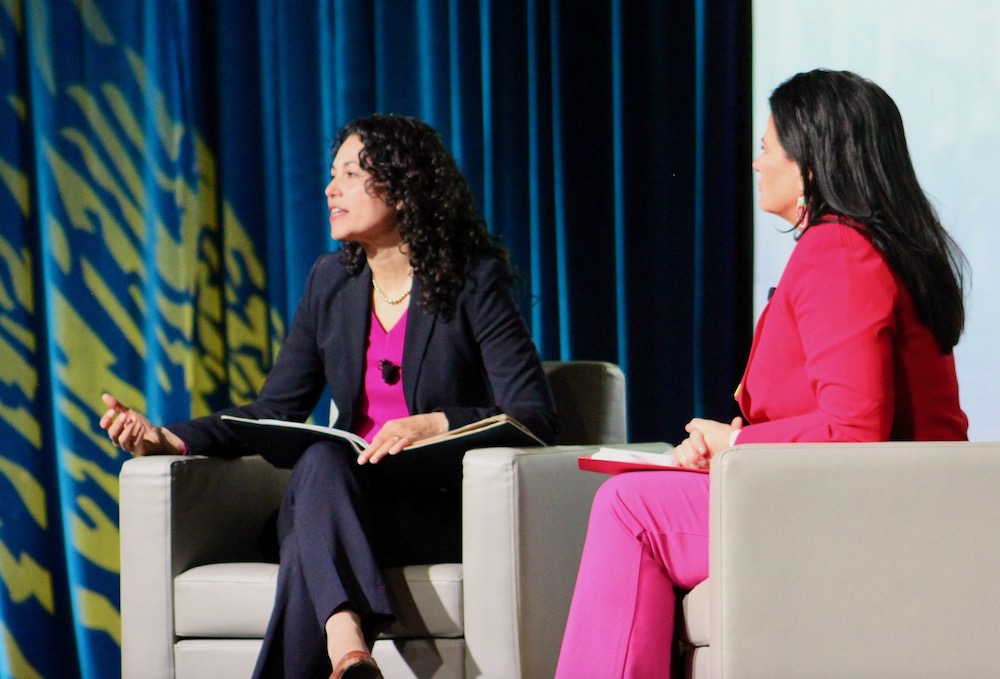
- Details
- By Chez Oxendine
The Department of Agriculture Forest Service will distribute $20 million in grant funding to help tribes access private markets for forest resilience and climate mitigation that have emerged in the wake of climate change.
Federally recognized tribes, Alaska Native Corporations, and Alaska Native villages will be eligible for the resultant competitive grant program.
The grants were announced earlier today by Agriculture Deputy Secretary Xochitl Torres Small during the winter session of the National Congress of American Indians in Washington, D.C.
The new grant initiative, funded by the Inflation Reduction Act, aims to give tribes broader access to emerging markets that will help them address the climate crisis, support Indigenous knowledge and strengthen tribal economies, according to a USDA announcement today.
Proposal submissions for the new grant opportunity are now open through grants.gov, and will be accepted through Aug. 21, 2024. Grants may support activities such as forest management plan development, reforestation, and biodiversity protection.
The new grant builds on existing USDA efforts to bolster co-stewardship relationships between tribes and the Forest Service, according to the announcement. USDA pointed to 120 co-stewardship agreements executed between tribes in 2023 — more than triple the number of relationships it forged in 2022 — as well as other funding allocated to climate mitigation projects.
Climate mitigation projects include a $2 million direct award to the Indian Land Tenure Foundation’s National Indian Carbon Coalition Project, as well as a $13 million agreement with the Denali Commission, a federal effort to support infrastructure and development throughout Alaska. That agreement includes $10 million for grants to support Alaska Native landowners and $3 million for grant application and management support.
Donate today so Native News is free for all readers.
“Tribal practices support resilient forests and land management for the benefit of future generations," Torres Small said.
The goal of the new grant program is to help Natives both join in widespread climate mitigation and preservation efforts while creating a “new line of income,” Torres Small told the audience at NCAI. As examples, she pointed to existing sequestration efforts by the Fond du Lac Band of Lake Superior Chippewa in Minnesota and the Yurok Tribe of Northern California.
Carbon sequestration, in particular, has become an increasingly popular method of turning sustainability into profitability for tribes. In Minnesota, for example, carbon offsets are expected to cover the costs of a 28,000-acre landback purchase by the Bois Forte Band of Chippewa that occurred in 2022.
“There’s a hope that by continuing this work and applying for these funds, you have the opportunity to turn it into a market,” Torres Small said. “Hopefully this investment in the work…creates an opportunity to do that even more and to be able to have a long term sustainable line of income as well.”
Levi Rickert provided additional reporting on this story from the NCAI winter session in Washington, D.C.
More Stories Like This
Tribes, Coastal Group Ask Army Corps to Revoke Permit for Texas Export TerminalMichigan Tribes Tell Supreme Court: Don’t Bail Out Enbridge
Alaskans Raise More Than $1 Million For Communities Devastated by Typhoon Halong
A True American Tale: Indigenous Rights vs. Corporate Greed
In photos: Residents of Western Alaska Share Storm Damage of Ex-Typhoon Halong
Help us tell the stories that could save Native languages and food traditions
At a critical moment for Indian Country, Native News Online is embarking on our most ambitious reporting project yet: "Cultivating Culture," a three-year investigation into two forces shaping Native community survival—food sovereignty and language revitalization.
The devastating impact of COVID-19 accelerated the loss of Native elders and with them, irreplaceable cultural knowledge. Yet across tribal communities, innovative leaders are fighting back, reclaiming traditional food systems and breathing new life into Native languages. These aren't just cultural preservation efforts—they're powerful pathways to community health, healing, and resilience.
Our dedicated reporting team will spend three years documenting these stories through on-the-ground reporting in 18 tribal communities, producing over 200 in-depth stories, 18 podcast episodes, and multimedia content that amplifies Indigenous voices. We'll show policymakers, funders, and allies how cultural restoration directly impacts physical and mental wellness while celebrating successful models of sovereignty and self-determination.
This isn't corporate media parachuting into Indian Country for a quick story. This is sustained, relationship-based journalism by Native reporters who understand these communities. It's "Warrior Journalism"—fearless reporting that serves the 5.5 million readers who depend on us for news that mainstream media often ignores.
We need your help right now. While we've secured partial funding, we're still $450,000 short of our three-year budget. Our immediate goal is $25,000 this month to keep this critical work moving forward—funding reporter salaries, travel to remote communities, photography, and the deep reporting these stories deserve.
Every dollar directly supports Indigenous journalists telling Indigenous stories. Whether it's $5 or $50, your contribution ensures these vital narratives of resilience, innovation, and hope don't disappear into silence.
 The stakes couldn't be higher. Native languages are being lost at an alarming rate. Food insecurity plagues many tribal communities. But solutions are emerging, and these stories need to be told.
The stakes couldn't be higher. Native languages are being lost at an alarming rate. Food insecurity plagues many tribal communities. But solutions are emerging, and these stories need to be told.
Support independent Native journalism. Fund the stories that matter.
Levi Rickert (Potawatomi), Editor & Publisher

